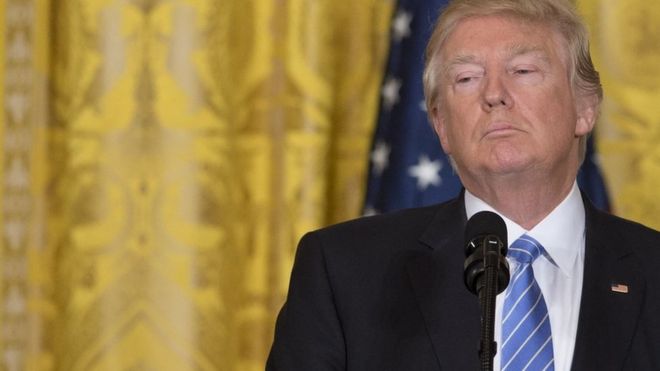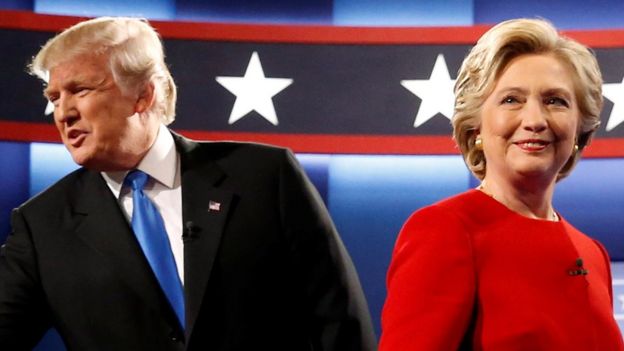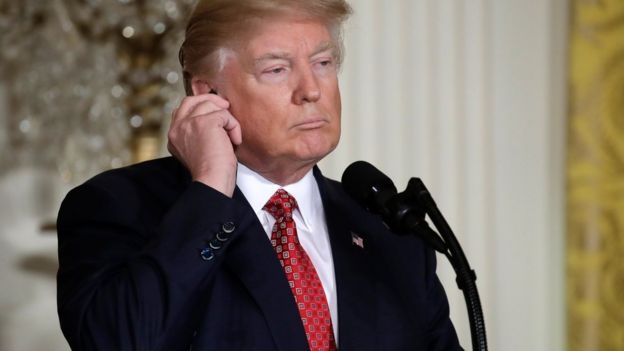- 16 February 2017
- US & Canada
-
(미국) 미 대통령 트럼프의 정신건강에 대한 논란국제문제/북미 2017. 2. 17. 23:23
출처: http://www.bbc.com/news/world-us-canada-38991171
밝은 하늘: 공개석상에서 자기 감정조차 제대로 통제하지 못하는 트럼프의 정신건강에 대한 전문가들의 지적들이 시사하는 바가 무엇일까 생각해본다. 미국에서는 칠푼이 트럼프가 있다면, 한국에서도 그 보다 더하면 더했지 결코 덜하지 않은 사람(?)이 있지 않은가? 결코 선택되어선 안 되는 사람이 한 나라의 지도자로 선택되었을 때 그 국민들과 그 국가가 겪어야 하는 불필요한 어려움은 누구 탓이며 누가 보상해줄 수 있단 말인가?
Trump's mental health debate: What is it about?
 AFP
AFPIn a letter, a group of mental health professionals said Mr Trump was incapable of serving as president It seems an incredible question to ask of a man who ran a multi-billion-dollar business and vanquished seasoned political opponents on his way to highest office in the US. But experts are debating the mental health of the US president.
The discussion of Donald Trump's mental health has come to the fore following an open letter from dozens of professionals who say his "grave emotional instability" make him unfit for the presidency. 많은 전문가들曰; 심각할 정도의 정서적 불안정 때문에 대통령직을 수행하기에 부적합하다. (come to the fore: 표면화되다, 주목받다)
The call seems to break a long-standing rule among experts of not diagnosing public people, and has been condemned by a leading psychiatrist, who described the "psychiatric name-calling" as an insult to the mentally ill. (name-calling: 욕하기, 욕설)
What is it about?
Debate over Mr Trump's mental fitness is nothing new, and existed even before his election, last November.
But the majority of mental health professionals have refrained from making public statements, following a self-imposed principle known as the "Goldwater rule", adopted by the American Psychiatric Association (APA) in 1973.
It prohibits psychiatrists from giving diagnosis about someone they have not personally evaluated. It was instated after a magazine asked thousands of experts in 1964 whether Republican nominee Barry Goldwater was psychologically fit to be president. 정신과의사들은 개인적으로 평가를 내려본 적이 없는 사람에 대해서 진단을 내릴 수 없다.
The APA warned last year that breaking the rule in trying to analyse the candidates in the presidential election was "irresponsible, potentially stigmatising, and definitely unethical".
 REUTERS
REUTERSPsychiatrists were warned against making assumptions about the mental health of the candidates But now, some professionals have spoken out, including those who have signed a petition asking for Mr Trump's removal. It has now gathered more than 23,000 signatures.
Some have suggested that Mr Trump has Narcissistic Personality Disorder (NPD). 자아도취적 인격장애
People with this condition often show some of the following characteristics, according to Psychology Today: 자아도취적 인격장애를 가진 사람들의 특징은 아래와 같다.
- Grandiosity, a lack of empathy for other people and a need for admiration 실속없이 거창해서 타인에 대한 공감이 부족하며 타인에게서 감탄을 필요로 함.
- They believe they are superior or may deserve special treatment 자신은 남보다 우수하다 혹은 특별한 취급을 받는 게 마땅하다고 믿음
- They seek excessive admiration and attention, and struggle with criticism or defeat
What is new?
In a letter to the New York Times, 35 mental health professionals warned that the "grave emotional instability" indicated in Mr Trump's speech and actions made him "incapable of serving safely as president".
They said experts had remained silent because of the Goldwater rule, but that it was time to speak out. "This silence has resulted in a failure to lend our expertise to worried journalists and members of Congress at this critical time. We fear that too much is at stake to be silent any longer."
 AP
APThe letter says Mr Trump has demonstrated an inability to tolerate different views The letter added: "Mr Trump's speech and actions demonstrate an inability to tolerate views different from his own, leading to rage reactions. His words and behaviour suggest a profound inability to empathise.
"Individuals with these traits distort reality to suit their psychological state, attacking facts and those who convey them (journalists, scientists)."
Earlier this week, Democratic Sen Al Franken said that "a few" of his Republican colleagues had expressed concern to him about Mr Trump's mental health. The concerns, he said, stemmed from questions about the president's truthfulness and the suspicion that Mr Trump "lies a lot".
Why the controversy?
Apart from the apparent break of the Goldwater rule, other professionals say the psychiatric diagnosis of Mr Trump is an insult to the mentally ill.
Also in a letter to the NYT, Dr Allen Frances, who helped write the Diagnostic and Statistical Manual of Mental Disorders IV, one of the main key manuals used to classify mental disorders, said that "most amateur diagnosticians have mislabelled" Mr Trump with the diagnosis of "narcissistic personality disorder".
"He may be a world-class narcissist, but this doesn't make him mentally ill, because he does not suffer from the distress and impairment required to diagnose mental disorder."
He added: "Mr Trump causes severe distress rather than experiencing it and has been richly rewarded, rather than punished, for his grandiosity, self-absorption and lack of empathy.
"It is a stigmatising insult to the mentally ill (who are mostly well behaved and well meaning) to be lumped with Mr Trump (who is neither).
"Bad behaviour is rarely a sign of mental illness, and the mentally ill behave badly only rarely. Psychiatric name-calling is a misguided way of countering Mr Trump's attack on democracy."
'국제문제 > 북미' 카테고리의 다른 글
(미국) 미국은 EU와 노트북컴퓨터 기내반입 금지를 논의할 예정 (0) 2017.05.13 (미국) 밴쿠버 트럼프 호텔의 성대한 개장식을 반대하는 훼방꾼들 (0) 2017.03.01 (미국) 트럼프의 反난민이민 행정명령에 대한 각국 반응 (0) 2017.02.02 (미국) 에너지초강대국 미국의 그레이트 게임 America's Great Game as energy superpower (0) 2016.11.23 (미국/동영상) Jill Stein: ‘Voters Being Intimidated Into Voting for a Corruption Queen or a Proto-Fascist’ (0) 2016.11.12